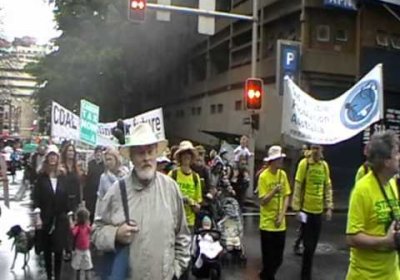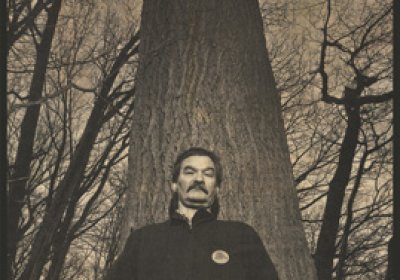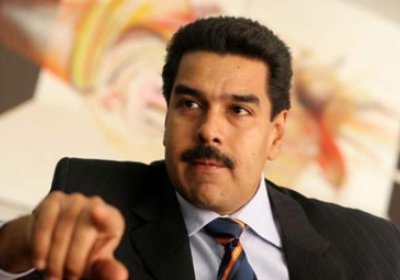A smaller crowd than last year turned out for the Sydney Walk Against Warming just a week before the August 21 federal election. I heard that organisers estimated 5000 but probably it was closer to 3000. Hopefully, the missing people were out in the suburbs campaigning for climate change action candidates!
844
Citizens rallied in two Afghan cities on July 10 and 11, chanting slogans against occupying powers and the unpopular regime of President Hamid Karzai for failing to protect civilians.
On July 10, hundreds took to the streets of Mazar-i-Sharif to demand that all occupation forces leave.
The protest was organised after an artillery barrage from occupying NATO forces killed six civilians in Paktia province on July 8 and US troops killed two civilians in a pre-dawn raid in the city on July 7.
Protesters chanted slogans against occupation forces and Karzai.
A Washington DC court convicted a repeat-offender in May for a crime that could have seen him spend years in prison.
The offender was not a BP executive found guilty of criminal negligence over the Gulf of Mexico oil spill. Nor was it any other environmental vandal.
It was climate change activist Ted Glick.
His crime was to hang two banners off the Hart Senate Office Building on Capitol Hill in September last year.
At the conclusion of the New Way Summit in Melbourne over July 1-4, a proposal was adopted stating that: “Aboriginal people be encouraged to take possession of unoccupied and Crown lands, including abandoned buildings, to assert their ownership and original title.”
This was the third New Way Summit on Indigenous rights to be held. The New Way Summit was initiated by Euahlayi man Michael Anderson from far-western New South Wales. The first summit was held in Canberra in January.
A series of investigations have cleared the climate scientists at the centre of the “climate gate” scandal of falsifying or suppressing data.
In November, a series of leaked emails from the Climatic Research Unit (CRU) at the University of East Anglia purporting to show them falsifying data to promote the concept of human-caused global warming were released to the media.
This occurred in the lead up to the United Nations December climate summit in Copenhagen.
Venezuelan President Hugo Chavez took a giant symbolic leap in the direction of Latin American independence on July 6 when Venezuela and Ecuador conducted the first bilateral trade deal between two countries using a new trading currency, the Sucre, instead of the US dollar.
The Unitary System of Regional Compensation (Sucre) is the currency the adopted last year by the Bolivarian Alliance of the Americas (ALBA) regional bloc to allow member states to trade without using the US dollar.
Pro-choice group Children by Choice has written to Queensland Premier Anna Bligh and two senior state ministers calling for a legislative review of the state's abortion laws, a move supported by the Queensland Council for Civil Liberties (QCCL), said the July 7 Courier-Mail.
However, Children by Choice spokesperson Cait Calcutt said all three leaders had replied that the government would not act, saying any change would be up to a private member's bill.
Venezuelan President Hugo Chavez said on July 2 that intelligence services at the Caracas airport have arrested a man wanted in connection with terrorist activities in Cuba from the 1970s.
The Venezuelan government said El Salvadorean Francisco Antonio Chavez Abarca tried to enter Venezuela on July 1 on a false Guatemalan passport. Interpol alerted Venezuelan authorities to his identity and requested his arrest.
On July 7, Venezuela extradited Chavez Abarca to Cuba to face charges for bombings on the island.
The German parliament met on June 30 to elect the country’s largely symbolic president. What should have been a fairly straightforward affair, however, turned into a political embarrassment for Chancellor Angela Merkel.
The new election was made necessary by the resignation of Horst Koehler on May 31, after a public outcry over his comments suggesting German military involvement in Afghanistan was commercially motivated.
Koehler’s resignation came as Merkel’s governing right-wing coalition was struggling in opinion polls.
The proposal for a visit to the 26 Irish counties that make up the southern state by the British head of state, Queen Elizabeth II, has drawn condemnation from Irish republicans.
Irish Taoiseach (head of government) Brian Cowan announced in June plans for a royal visit, believed to be for sometime in 2011. It would be the first visit by the British head of state to the southern Irish state since it was founded in 1921.
On June 19, six executives — the entire board of Australian mining corporation Sundance Resources — were killed in a plane crash in the Republic of the Congo. Australian politicians and the corporate media emphasised the tragedy of their untimely deaths, showering praise on the deceased.
Aboriginal academic and activist Sharon Firebrace is the Victorian Socialist Alliance Senate candidate in the federal election. Firebrace founded the Aboriginal Genocide Centre. Repealing the NT intervention and standing up for refugee rights are key parts of her election policy.
Below, she responds to Labor Prime Minister Julia Gillard’s announcement on refugees.
***
- Page 1
- Next page









